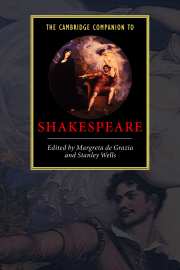Book contents
- Frontmatter
- 1 Shakespeare’s life
- 2 The reproduction of Shakespeare’s texts
- 3 What did Shakespeare read?
- 4 Shakespeare and the craft of language
- 5 Shakespeare’s poems
- 6 The genres of Shakespeare’s plays
- 7 Playhouses, players, and playgoers in Shakespeare’s time
- 8 The London scene
- 9 Gender and sexuality in Shakespeare
- 10 Outsiders in Shakespeare’s England
- 11 Shakespeare and English history
- 12 Shakespeare in the theatre, 1660-1900
- 13 Shakespeare in the twentieth-century theatre
- 14 Shakespeare and the cinema
- 15 Shakespeare on the page and the stage
- 16 Shakespeare worldwide
- 17 Shakespeare criticism, 1600--1900
- 18 Shakespeare criticism in the twentieth century
- 19 Shakespeare reference books
- Index
5 - Shakespeare’s poems
Published online by Cambridge University Press: 28 May 2006
- Frontmatter
- 1 Shakespeare’s life
- 2 The reproduction of Shakespeare’s texts
- 3 What did Shakespeare read?
- 4 Shakespeare and the craft of language
- 5 Shakespeare’s poems
- 6 The genres of Shakespeare’s plays
- 7 Playhouses, players, and playgoers in Shakespeare’s time
- 8 The London scene
- 9 Gender and sexuality in Shakespeare
- 10 Outsiders in Shakespeare’s England
- 11 Shakespeare and English history
- 12 Shakespeare in the theatre, 1660-1900
- 13 Shakespeare in the twentieth-century theatre
- 14 Shakespeare and the cinema
- 15 Shakespeare on the page and the stage
- 16 Shakespeare worldwide
- 17 Shakespeare criticism, 1600--1900
- 18 Shakespeare criticism in the twentieth century
- 19 Shakespeare reference books
- Index
Summary
Though Shakespeare was celebrated as a playwright during his lifetime, he seems to have been almost as well known for his narrative and lyrical poems. His short epics Venus and Adonis and The Rape of Lucrece - apparently written while the theatres were closed by plague in 1592-4 - went through numerous editions and were widely quoted and imitated. By 1598, the commentator Francis Meres was comparing his 'mellifluous and honey-tongued' contemporary to the Roman poet Ovid and picking out for approval 'his sugared sonnets among his private friends'. It is possible that Meres was referring to privately circulated poems which have now been lost, but most scholars believe that he had in mind manuscript versions of the sonnets which Shakespeare wrote and revised over several more years until they (or a selection of them) were printed in 1609 in conjunction with his most intricate long poem, 'A Lover's Complaint'. Meanwhile the corpus of indubitably authorial poems was completed in 1601 with the publication of 'The Phoenix and Turtle' - an allegorically suggestive elegy for a couple of birds, which appeared in Robert Chester's enigmatic Love's Martyr alongside lyrics on the same subject by leading poets of the day.
- Type
- Chapter
- Information
- The Cambridge Companion to Shakespeare , pp. 65 - 82Publisher: Cambridge University PressPrint publication year: 2001
- 1
- Cited by



